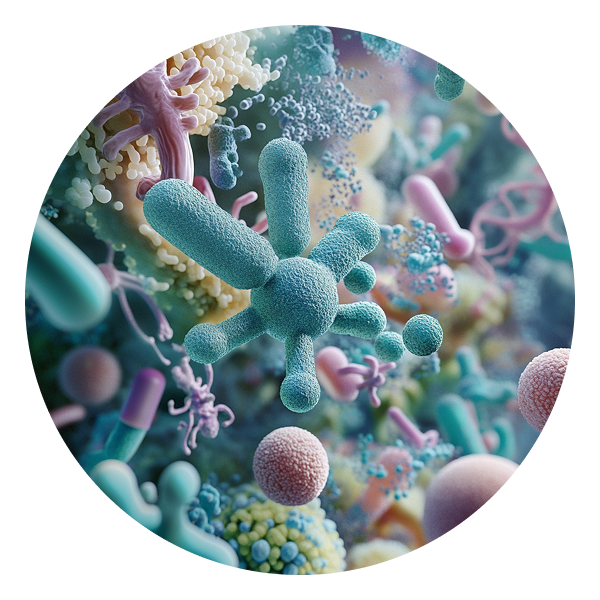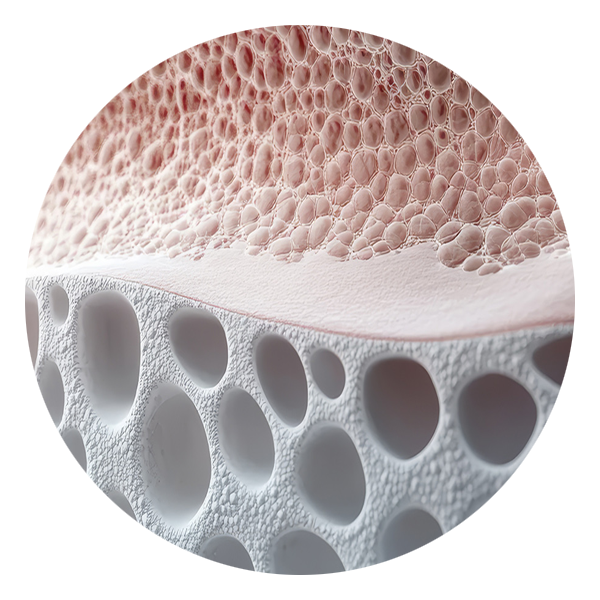Understanding the Gut-Bone Axis, Osteopenia, Osteoporosis, and Menopause
Bone health is a dynamic interplay of hormonal, genetic, and environmental factors.
Among these, the gut microbiota has emerged as a critical regulator of bone metabolism, forming what is known as the “gut-bone axis.” This interrelationship involves immune signaling, nutrient absorption, and endocrine function, all influenced by microbial composition.
Scientific studies indicate that specific gut bacteria influence bone remodeling processes via the modulation of inflammatory cytokines, production of short-chain fatty acids, and enhancement of mineral absorption. Dysbiosis—an imbalance in gut microbial communities — has been linked to increased intestinal permeability and systemic inflammation, both of which may impair bone metabolism Zhao et al., 2024.

Osteopenia and osteoporosis represent progressive stages of bone mineral density loss, with osteoporosis being the more severe form.
Both conditions increase the risk of fractures and diminish quality of life, especially in aging populations. Women entering menopause are particularly vulnerable due to a sharp decline in estrogen, which disrupts bone remodeling and accelerates demineralization.
Recent research has demonstrated that targeted probiotic interventions can positively affect the gut microbiome, enhancing calcium absorption and supporting bone density. NORDBIOTIC™ OsteoDuo™ is designed to leverage this connection, offering a clinically tested probiotic strategy to help mitigate bone loss in postmenopausal women.

Probiotics and Bone Health
Randomized controlled trials confirm the efficacy of probiotics in supporting bone metabolism
Demonstrated benefits include preserved vitamin D levels, reduced bone demineralization, and microbiome modulation
Studies reinforce efficacy of clinically studied probiotics such as NORDBIOTIC™ strains
Randomized controlled trials confirm the efficacy of probiotics in supporting bone metabolism
Demonstrated benefits include preserved vitamin D levels, reduced bone demineralization, and microbiome modulation
Studies reinforce efficacy of clinically studied probiotics such as NORDBIOTIC™ strains
Key proven benefits
of NORDBIOTIC™ OsteoDuo
Reduced Risk of Bone Demineralization
Supplementation with NORDBIOTIC™ OsteoDuo reduced the risk of bone demineralization assessed by T-score of the lumbar spine (L1–L4) using dual-energy X-ray absorptiometry (DEXA). In the placebo group, a statistically significant decrease in T-score was observed, whereas in the probiotic group, the decrease was smaller and not statistically significant. Median T-score changes over 12 months were -0.05 (probiotic group) vs. -0.1 (placebo group).
Vitamin D Preservation
Among women with normal baseline vitamin D levels (>30 ng/mL), NORDBIOTIC™ OsteoDuo supplementation prevented significant declines over 12 months without additional vitamin D intake. The placebo group saw statistically significant reductions, while the probiotic group did not.
Key ingredients
Lactobacillus plantarum NORDBIOTIC™ LP140 and Lactobacillus paracasei NORDBIOTIC™ LPC100
Type
Double-strain probiotic formulation
Study
Multicenter prospective two-arm interventional randomized double-blind placebo-controlled clinical trial involving 167 postmenopausal women
Safety
Exceedingly well-tolerated with no reported adverse effects
Dosage
5 x 10⁹ CFU daily (combined LP140 and LPC100)
Duration
12 months
Conclusions
NORDBIOTIC™ OsteoDuo supplementation demonstrated reduced bone demineralization risk and preserved vitamin D levels in postmenopausal women. No significant adverse events were observed, confirming an excellent safety profile.
| NORDBIOTIC™ OsteoDuo | Non-clinically tested probiotics | |
|---|---|---|
| Proven effectiveness | ||
| Safety and reliability | ||
| Strain specificity | ||
| Trust and transparency |
NORDBIOTIC™ MenoDuo is based on the same dual-strain probiotic platform as NORDBIOTIC™ OsteoDuo and is enhanced with ingredients tailored for menopausal health challenges.
Menopause is associated with a sharp decline in estrogen, significantly increasing the risk of osteopenia and osteoporosis. MenoDuo targets these risks while also addressing hormonal and quality-of-life symptoms.
Key active components:
Lactobacillus plantarum LP140 and Lactobacillus paracasei LPC100 (as in NORDBIOTIC™ OsteoDuo™)
Soy Isoflavones — Natural phytoestrogens supporting estrogen balance and bone maintenance
Hop Extract — Rich in 8-prenylnaringenin, supports mood, sleep, and reduces hot flashes
Vitamin B6 — Supports hormonal balance and reduces fatigue
Benefits of MenoDuo
Supports bone density and vitamin D levels during menopause
Reduces menopausal symptoms (hot flashes, fatigue, sleep issues)
Promotes hormonal balance and emotional
well-being
NORDBIOTIC™ OsteoDuo supplementation demonstrated reduced bone demineralization risk and preserved vitamin D levels in postmenopausal women. No significant adverse events were observed, confirming an excellent safety profile.
For more information and inquiries
Contact us at: hello@nordicbiotic.com
References
- Zhao Y, Li X, Wang H, et al. The gut-bone axis: How the microbiota influences bone metabolism. J Bone Miner Res. 2024;39(3):478-488.
- Pacifici R. Role of T cells in ovariectomy induced bone loss—revisited. J Bone Miner Res. 2012;27(2):231-239.
- Britton RA, Irwin R, Quach D, et al. Probiotic L. reuteri treatment prevents bone loss in a menopausal model via microbial modulation. J Cell Physiol. 2014;229(11):1822–1830.
- Weaver CM. Diet, gut microbiome, and bone health. Curr Osteoporos Rep. 2015;13(2):125–130.
- EFSA Panel on Dietetic Products, Nutrition and Allergies. Scientific opinion on the substantiation of health claims related to calcium and vitamin D and maintenance of normal bones. EFSA Journal. 2010;8(10):1807.
- Li JY, Chassaing B, Tyagi AM, et al. Sex steroid deficiency-associated bone loss is microbiota dependent and prevented by probiotics. J Clin Invest. 2016;126(6):2049–2063. doi:10.1172/JCI86062
- Głogowska-Szeląg, J., Palka-Kisielowska, I., Porawska, W., Bierła, J. B., Szczepankowska, A. K., Aleksandrzak-Piekarczyk, T., & Cukrowska, B. (2024). The effect of Lacticaseibacillus paracasei LPC100 and Lactiplantibacillus plantarum LP140 on bone mineral density in postmenopausal women: A multicenter, randomized, placebo-controlled study. Journal of Clinical Medicine, 13(19), 5977. https://doi.org/10.3390/jcm13195977